"If This World Were Mine" is a 1967 song by soul music duo Marvin Gaye and Tammi Terrell from their album United. Written solely by Gaye, it was one of the few songs they recorded without Ashford & Simpson writing or producing. When it was released as a single in November 1967 as the B-side to the duo's "If I Could Build My Whole World Around You", it hit the Billboard pop singles chart, peaking at number sixty-eight, and peaked at number twenty-seven on the Billboard R&B singles chart. Gaye would later put the song into his set list during his last tours in the early-1980s as he performed a medley of his hits with Terrell. The song was covered a year later by Joe Bataan on the 1968 Fania Allstars LP Live at the Red Garter, Vol. 2, and in 1969 by Ambrose Slade (pre-Slade) on their album Beginnings.

"The Best Things in Life Are Free" is a duet between American singers Luther Vandross and Janet Jackson, recorded for the Jimmy Jam and Terry Lewis produced soundtrack to the 1992 American film Mo' Money, starring Damon Wayans. The song was composed by Jam, Lewis, Michael Bivins, Ronnie DeVoe, Harry Wayne Casey and Richard Finch. The song was released as the soundtrack's lead single on May 12, 1992, by Perspective Records and A&M Records. Additionally, the song was remixed by David Morales, Frankie Knuckles, and CJ Mackintosh. The duet became a major hit in several countries, peaking at number two in Australia and the United Kingdom, number six in Ireland and New Zealand, number eight in Canada and Germany, and number 10 in the United States. Its music video was directed by Paris Barclay, but didn't feature Vandross and Jackson. The song was nominated for the Grammy Award for Best R&B Performance by a Duo or Group with Vocals.
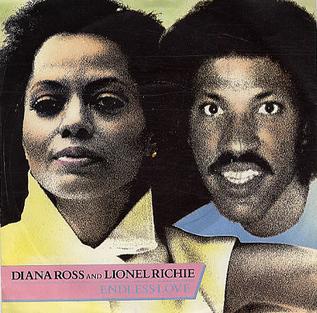
"Endless Love" is a song written by Lionel Richie and originally recorded as a duet between Richie and singer/actress Diana Ross. In this ballad, the singers declare their "endless love" for one another. It was covered by Luther Vandross with R&B-pop singer Mariah Carey, and also by country music singer Shania Twain. Richie's friend Kenny Rogers also recorded the song. Billboard has named the original version as the greatest song duet of all time.

"Until You Come Back to Me (That's What I'm Gonna Do)" is a song written by Morris Broadnax, Clarence Paul, and Stevie Wonder. The song was originally recorded by Stevie Wonder in 1967, but his version was not released as a single and did not appear on an album until 1977's anthology Looking Back. The best-known version of this song is the 1973 release by Aretha Franklin, who had a million-selling top 10 hit on Billboard charts. The song reached No. 1 on the R&B chart and No. 3 on the Hot 100 chart in 1974. It became an RIAA Gold record.

"Never Too Much" is the debut song written, composed, produced, and performed by Luther Vandross. The R&B song was released in 1981, as the lead single from Vandross's debut album of the same name. The title track hit number one on the US Billboard Hot R&B/Hip-Hop Songs chart and number four on the US Billboard Dance Club Songs chart. It peaked at #27 in Cash Box and #33 on the US Billboard Hot 100.
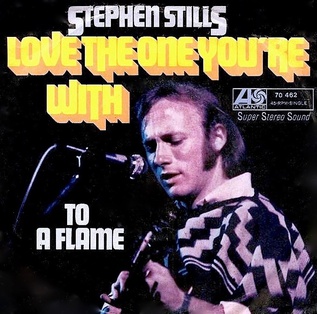
"Love the One You're With" is a song by American folk rock musician Stephen Stills. It was released as the lead single from his debut self-titled studio album in November 1970. The song, inspired by a remark Stills heard from musician Billy Preston, became his biggest hit single, peaking at No. 14 on the Billboard Hot 100 in early 1971. David Crosby and Graham Nash, Stills's fellow members of Crosby, Stills & Nash, provide background vocals on the song. Also providing the backups are Rita Coolidge, her sister Priscilla Jones, and John Sebastian. They all sing the "Do Dos" that come before the instrumental portion and the outro. The song was also recorded by the Isley Brothers, The Meters, Bucks Fizz, Luther Vandross, Bob Seger and Richard Clapton, among others.
"Dance with My Father" is a song by Luther Vandross and the title track to his thirteenth studio album. It was released in May 2003 as the album's lead single. With Richard Marx, Vandross wrote the song based on his personal experience. The lyrics recall childhood memories with Vandross's father, who used to dance with him and his mother.
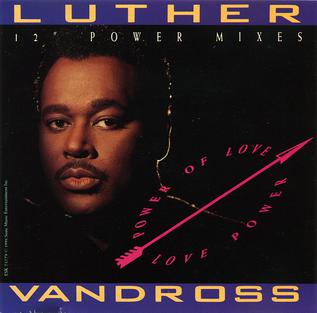
"Power of Love/Love Power" is a single by American singer-songwriter Luther Vandross. It was released on April 9, 1991 as the lead single from his 1991 album of the same name. The song spent two weeks at number one on the US R&B chart, and peaked at number four on the US pop chart, becoming his biggest pop solo hit.
"Superstar" is a 1969 song written by Bonnie Bramlett and Leon Russell, that has been a hit for many artists in different genres in the years since. The best-known versions are by the Carpenters in 1971, Luther Vandross in 1983, and Sonic Youth in 1994.

"I Can Make It Better" is a song by American recording artist Luther Vandross. It was released in 1996 as the second single from his tenth and platinum album, Your Secret Love (1996). The song reached number 15 on the US Billboard Hot R&B Singles chart and peaked in the top fifty on the UK Singles Chart. A music video was also produced to promote the single.

"Buy Me a Rose" is a song written by Jim Funk and Erik Hickenlooper, and recorded by American country music artist Kenny Rogers. It was released in October 1999 as the third single from his album She Rides Wild Horses and peaked at number one on the Billboard Hot Country Singles & Tracks charts in May 2000. The song made Rogers the oldest country singer to have a number one hit until Willie Nelson beat the record through a duet with Toby Keith on his 2003 single "Beer for My Horses". "Buy Me a Rose" was Rogers' first number one hit since 1987's "Make No Mistake, She's Mine" and his final charting top 40 hit on the US Billboard Hot 100 chart since 1984's "What About Me?".
"Jump to It" is a 1982 song by American recording artist Aretha Franklin. The track is from her Gold-certified 1982 album of the same name, produced by Luther Vandross. The song was written by Vandross and Marcus Miller and features background vocals performed by Vandross and Cissy Houston. The single reached No. 1 on Billboard's Hot Soul Singles chart, remaining there for four consecutive weeks.
"Stop to Love" is a song by American recording R&B/soul artist Luther Vandross. Released in 1986 as the lead single from his album Give Me the Reason. It was his first number-one single on the R&B chart since "Never Too Much" in 1981. The upbeat single was also a crossover hit, peaking at number fifteen on the Billboard Hot 100.
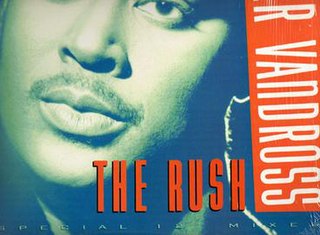
The Rush is a song by American recording R&B artist Luther Vandross', released as the third single from his 1991 album, Power of Love. It reached number six on the US R&B Singles chart and peaked at number 73 on Billboard's Hot 100 in January 1992. The next single to follow was "Sometimes It's Only Love".
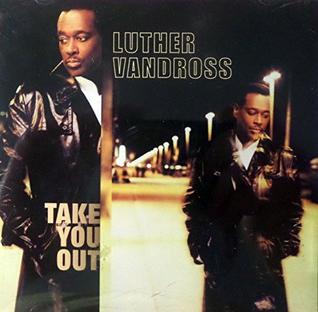
"Take You Out" is a song by American recording artist Luther Vandross. It was written by Warryn Campbell, Harold Lilly, and John Smith and produced by the former for Vandross's self-titled twelfth studio album (2001). Released as the album's lead single, the song topped the US Adult R&B Songs chart and became a top ten hit on the Hot R&B/Hip-Hop Songs, while peaking at number 26 on the Billboard Hot 100. "Take You Out" was later interpolated by American rapper Jay-Z in his song "Excuse Me Miss", on his album The Blueprint 2: The Gift & The Curse, released in 2002.

"How Many Times Can We Say Goodbye" is a 1983 song by Dionne Warwick and Luther Vandross. The ballad was issued as the lead single of Warwick's album How Many Times Can We Say Goodbye, later appearing on Vandross' album Busy Body, both of which were released in 1983.
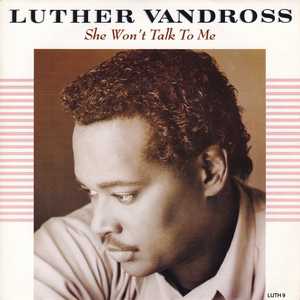
"She Won’t Talk to Me" is a song by American recording artist Luther Vandross released in 1988. It is the second single from his album Any Love. The song was a top five U.S. R&B hit, top 20 dance play hit, and a #30 pop hit on Billboard’s Hot 100. Vandross performed the song on the January 28, 1989 episode of Saturday Night Live.
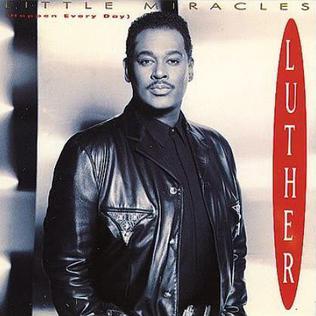
"Little Miracles (Happen Every Day)" is a song by American recording artist Luther Vandross. Released in April 1993 by Epic Records, the single supports his platinum and eight album, Never Let Me Go (1993). The song was written by Vandross and Marcus Miller, and produced by them both. It became a top ten hit on the US Billboard Hot R&B Singles chart and reached top 30 on the UK Singles Chart. It also became the most successful single from the album on the Billboard Hot 100, peaking at number sixty-two. "Little Miracles (Happen Every Day)" was nominated for best R&B songwriting at the 36th Grammy Awards in March 1994.

"Heaven Knows" is a song by American singer-songwriter Luther Vandross, released in September 1993 by Epic and Sony as the second single from his eight studio album, Never Let Me Go (1993). The song was written by Vandross with Reed Vertelney and produced by Marcus Miller. It peaked in the top 30 on both the US Billboard Hot R&B Singles and Hot Dance Club Play charts, and also at thirty-three on the Billboard Hot Adult Contemporary Singles chart. "Heaven Knows" was nominated for Best R&B Song alongside "Little Miracles " at the 36th Annual Grammy Awards in March 1994, losing to "That's the Way Love Goes" by Janet Jackson.
"I Really Didn't Mean It" is a 1987 song by American recording R&B/soul artist Luther Vandross. The track was the fourth and final single released from his multi-platinum album Give Me the Reason. The song was a top ten R&B hit on Billboards Hot Black Singles chart.














